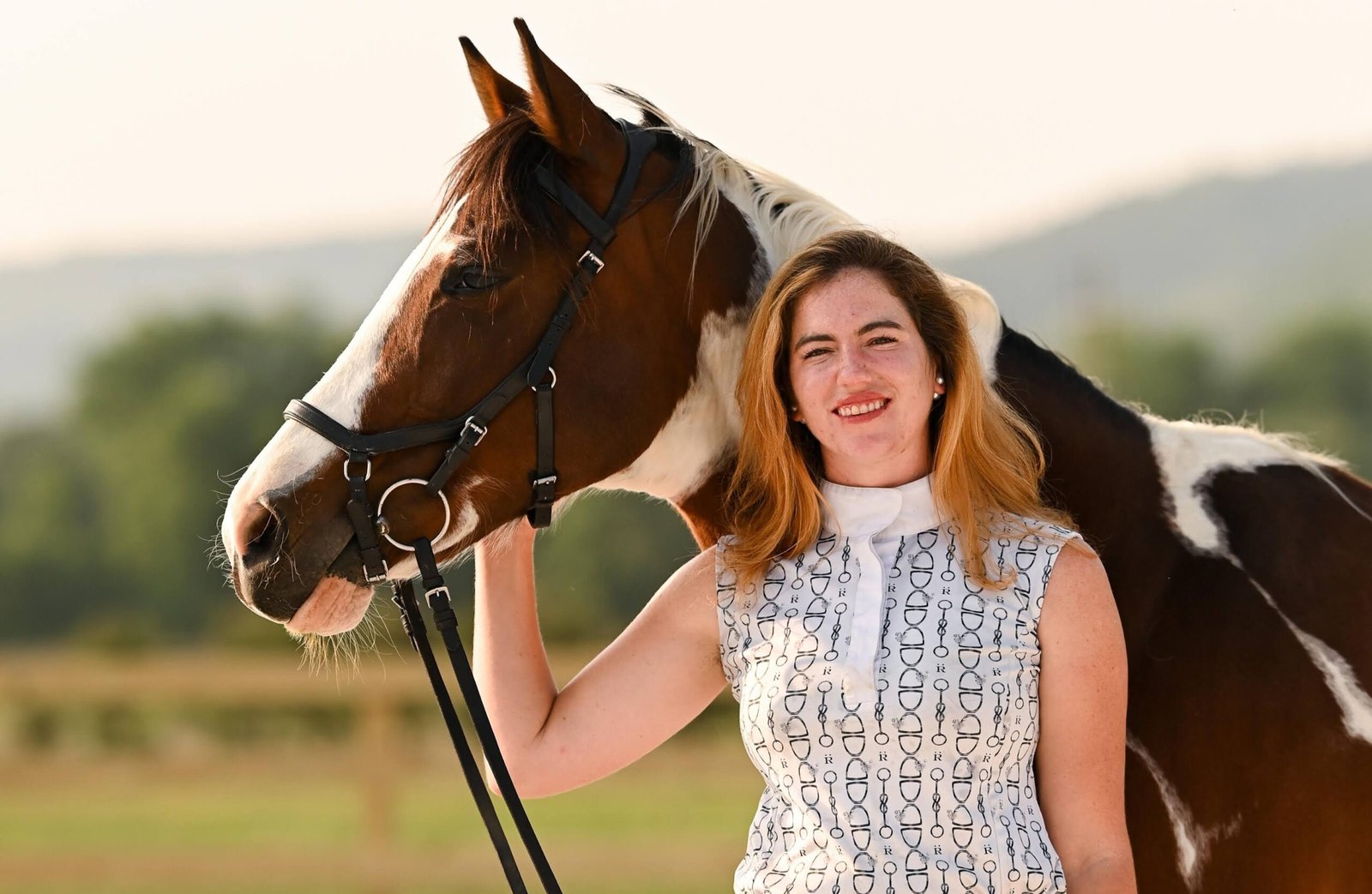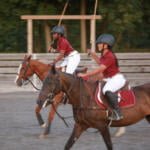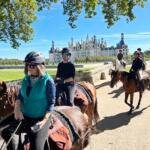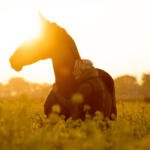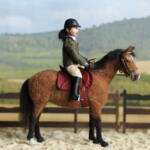Sellers Shook is a lifelong horse lover building a dressage program on her dream property in the French Broad River valley, in Pisgah Forest, North Carolina.
As a new professional in the industry, Sellers believes in nurturing authentic connection with her horses and striving for quality over quantity in her training. BRU spoke with Sellers about her goals, her tiny house, and what the horse industry can do to support beginners.
This interview has been edited for length and clarity.
BRU: What first drew you to horses, and how did you start riding?
SS: It was just something I always wanted to do. I grew up in the suburbs, and I started riding at Camp Illahee when I was ten. I eventually ended up directing the equestrian program there.
I was able to buy a thoroughbred when I was in high school, and we started transitioning from hunter/jumpers to eventing and pony club, but my horse had to be put down when he was only eight. Then I bought my current paint mare. After her ninety days with a trainer, I fell off on the first ride! But she looked great then, and she still does.
BRU: What do you enjoy about the disciplines and training styles you’ve participated in?
SS: I think starting in hunter/jumper is pretty appropriate. The school of forward riding is fun, it teaches you a lot of important skills like balance, control, and speed. But, after starting pony club, I wanted to understand dressage better.
When I began working at Illahee, the director there was a dressage trainer, and she’s still my trainer now. I was really drawn to the words she used. They were different from what I heard growing up. I loved being able to focus on the horse’s way of going and the communication and the aids.
Dressage is my favorite because it requires a level of connection that’s strong and deep and greater than what someone can teach. I think everyone should try it—it’s not as stuffy as it seems!
BRU: Is there anyone in the horse community who has made a positive impact on your life?
SS: My childhood trainer Jeanne Cox. She’s retired now, but, you know—your childhood trainer becomes your second mom.
BRU: What are some of the biggest highlights of your time as an equestrian?
SS: I loved my time on the Outerbanks in North Carolina. I was a trail guide for a year during the shoulder season. I brought my horse and got to spend my free time going on hour-long trail rides that opened up on an empty beach on the Atlantic Ocean. That was incredible. When my horses bring me closer to nature, it all comes together for me.
BRU: What are some difficulties you’ve experienced related to horses?
SS: Adapting to doing things in a new way is always a challenge, and anytime I’ve doubted my intuition with a horse, it usually turns out that following my instincts would have been better, so that’s very frustrating. Finances are always a source of worry. I’m going for more peace of mind and quality in my decision-making now.
BRU: Has there been a time that horses have helped you through something hard?
SS: When I was sixteen, my dad passed away and my thoroughbred had to be put down within a year, so buying the horse I have now, Daisy, was very helpful. It was a big confidence boost because I felt proud that I was able to ride a sassy four-year-old. She also gave me a place to go and motivation and responsibility. She was a helpful friend for my entire twenties and is now helping me teach others and work towards my USDF Bronze Medal.
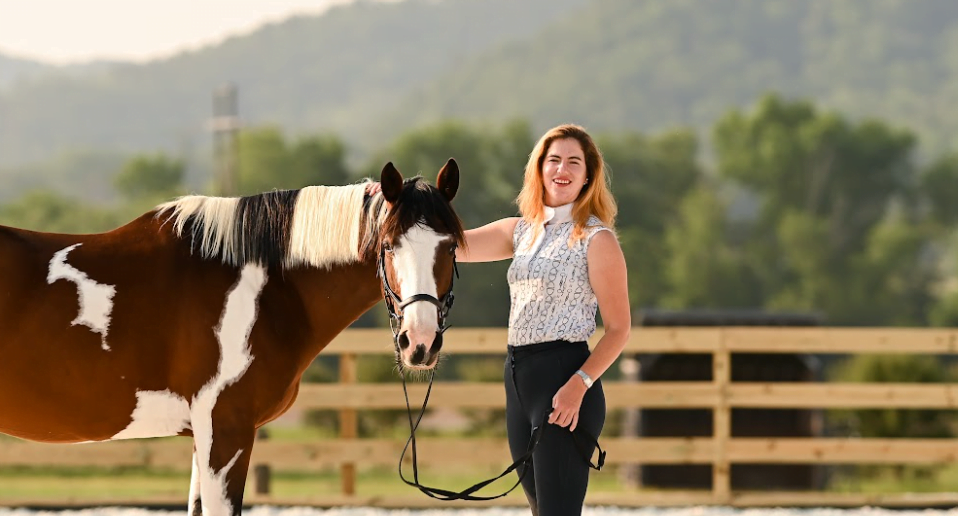
BRU: What led you to start Bent River Equestrian?
SS: When I saw my property for the first time, I just felt in my heart and soul that I would buy it one day. It came on the market two and a half years later, and there was no doubt in my mind that I had to make it work.
Luckily that was 2018, and things were relatively normal, so I was able to purchase it and get it fenced in. There was one building on the place, and it was just a two-stall barn kit! I turned it into my tiny home by putting a kitchen and bathroom in it, and I sleep in the loft.
When chaos struck in 2019, things were very stressful at first, but they’ve normalized. I was able to get my arena constructed, and now I have a barn coming.
BRU: Tell me more about your horses and your farm.
SS: I’m developing two sales horses. My main focus is always Daisy, who is my paint and the horse I’m working toward my bronze medal with. She’s the star. I have a couple of others as well who I consider more on the rescued and retired side, and I still enjoy having them on the farm.
I support my farm teaching lessons, and I have tenants at an RV site on my property. I worked full-time all last year, and I just got a dream remote job with a media company. Once my barn is constructed, I may have boarders.
I bring working students in a few days a week to help me with the horses. They tack and untack and groom and hand walk everybody, and then they get a lesson. That’s been really rewarding.
BRU: What’s a typical day like for you?
SS: Well, it’s pouring today, but I’m going to ride after this. I’m so lucky that I can see all of my horses from my window, so in the morning I crawl down from the loft in my tiny home and check on them. Then I pour my coffee and wait for sunrise before I feed breakfast.
The mountain air doesn’t warm up until noon in the spring, so that’s been a fun change to adapt to. In the summer, I ride right after breakfast, but in the winter, I try to wait until the nicest part of the day. I love the flexibility and adaptability of living here on the farm. It’s really changed my life.
BRU: What are some of your other long-term goals?
SS: I’d love to do most of the training on the horses that I go for my bronze with. I want to get into breeding. I have such a strong attachment to my mares that I’d have a hard time not having something related to them in my life.
I’m also considering applying to vet school because I know the demand is high, and we have one of the best vet schools in the country in North Carolina. I like to keep my options open and see where they carry me. I don’t even know if I’d be accepted to vet school, but it’s not the worst thing I’ve thought of!
BRU: What advice would you give other equestrians who want to eventually work as professionals?
SS: I would say to find a good trainer who is about quality over quantity, and work on cultivating your relationship with them first. Keep everything fun and lighthearted for as long as possible. Don’t be afraid to ask for help. It’s important to find two or three adults you trust and want to be like. Be sure those are the people you take advice from.
BRU: Do you have any ideas about supporting beginners or increasing access to horse sport?
SS: I hope we can all do that. Teaching others and giving back should be a part of everyone’s business because the people you introduce to horses are some of the best, most trusting relationships you can build.
I’m volunteering to support multiple schooling shows this year. I believe all professionals should assume some responsibility to help put on accessible shows. Most people don’t begin showing at recognized shows, and schooling shows are a great way to motivate people and horses to improve and seek better training.
To learn more about Sellers and Bent River Equestrian, follow her journey at bentriverequestrian.com.
If you have a story about how horses or horse people have improved your life, please consider sharing!
Photos courtesy of Sellers Shook.

